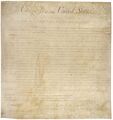Template:Selected anniversaries/December 15: Difference between revisions
No edit summary |
No edit summary |
||
| Line 37: | Line 37: | ||
||1916 – Maurice Wilkins, New Zealand-English physicist and biologist, Nobel Prize laureate (d. 2004) | ||1916 – Maurice Wilkins, New Zealand-English physicist and biologist, Nobel Prize laureate (d. 2004) | ||
||Leo Königsberger (d. 15 December 1921) was a German mathematician, and historian of science. He is best known for his three-volume biography of Hermann von Helmholtz, which remains the standard reference on the subject. Pic. | |||
||1924 – Frank W. J. Olver, English-American mathematician and academic (d. 2013) | ||1924 – Frank W. J. Olver, English-American mathematician and academic (d. 2013) | ||
Revision as of 11:52, 4 February 2018
1791: The United States Bill of Rights becomes law when ratified by the Virginia General Assembly.
- János Bolyai.jpg
1802: Mathematician and academic János Bolyai born. He will be one of the founders of non-Euclidean geometry.
1832: Engineer Gustave Eiffel born. He will design the world-famous Eiffel Tower.
1836: A fire at the U.S. Patent Office destroys all 10,000 patents and several thousand related patent models.
1857: Engineer George Cayley dies. He did pioneering work in aeronautics, investigating and codifying the dynamics of flight.
1887: Mark Twain declines to invest in transdimensional corporation, denounces offer as "a pyramid scheme of Pharaonic proportions."
1958: Theoretical physicist Wolfgang Pauli dies. Pauli received the Nobel Prize in Physics for his "decisive contribution through his discovery of a new law of Nature, the exclusion principle or Pauli principle".
1970: Soviet spacecraft Venera 7 successfully lands on Venus. It is the first successful soft landing on another planet.
1979: Army research laboratories convert modern plowshares into ancient swords. Military contractors call technique "Astonishing breakthrough."
2000: The third reactor at the Chernobyl Nuclear Power Plant is shut down.








